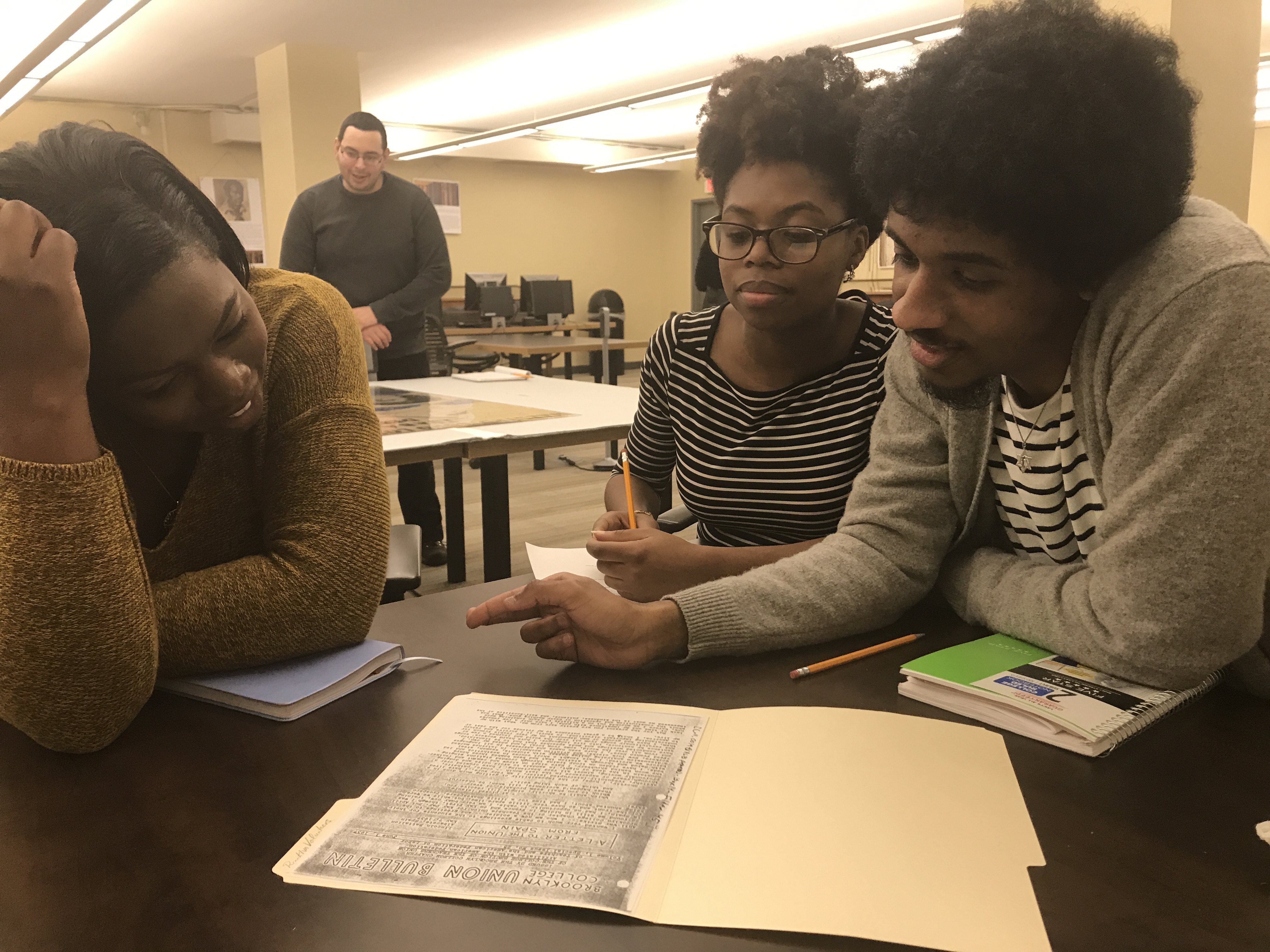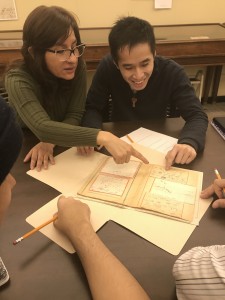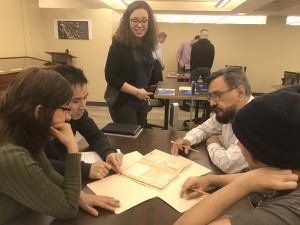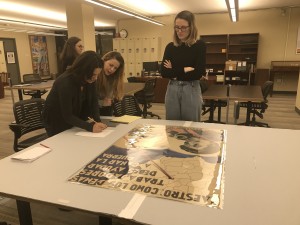A Transformative Dive into the Archive
CUNY Students Work in the ALBA Collection and Hunter College Archives
What does it mean for undergraduates to do the work of narrating memory? Two faculty and one librarian worked with undergraduate students in the Hunter College Archives and the ALBA Collection at the Tamiment Library. The experience was transformative for all.

Hunter College students research the ALBA Collection at the Tamiment Library (NYU), April 2018. Photo María Hernández Ojeda.
Editors’ note: The following is an excerpt from an article published in The Journal of Interactive Technology and Pedagogy.
For the past five years, students in our courses at Hunter College have performed research in the institutional archives at Hunter and the Tamiment Library, exploring topics such as the efforts of Hunter women to establish free kindergarten in New York City, to organize the Lenox Hill Settlement House, and to become involved in CUNY student activism during the two World Wars and the Spanish Civil War. María Hernández-Ojeda’s Narrating Memory assignment is part of her courses on Spanish literature, while Wendy Hayden’s Rhetorical Reflections assignment is included in her courses on rhetoric and writing. The students have made their work available on three WordPress based sites: Narrating Memory, Rhetorical Reflections in the Hunter College Archives, and Archival Research and Rhetoric. Iris Finkel, Reference and Instruction Librarian at Hunter College, has assisted students and faculty with research assignments in physical and digital archives and used her digital humanities expertise to help students and faculty understand the norms and creative approaches to digital presentation.

Hunter College students research the ALBA Collection at the Tamiment Library (NYU), April 2018. Photo María Hernández Ojeda.
María’s undergraduate classes concentrate on 20th-century Spanish literature, where the Spanish Civil War serves as a common subject uniting historical and fictional narratives in the course. The ALBA Collection at NYU’s Tamiment Library, which includes primary-source documents related to the Americans who volunteered to serve in the SCW, brings the past to life for contemporary CUNY students.
At the Tamiment, María initially worked with former Public Services and Instruction Librarian Kate Donovan and currently works with Public Service Librarian Sara Moazeni and Reference Associate Danielle Nista. The librarians reviewed the course syllabus and became familiar with the course goals prior to the first class visit. After introducing the students to the ALBA collection, the librarians provided an information sheet and instructional activities for students to discuss in groups in order to familiarize them with the archival material.
In February 2018, librarian Danielle Nista arranged four sets of documents (posters, diaries, and photos) for our analysis. She organized four groups of approximately five students so they could rotate and discuss each item to provide a broad introduction to the archives.
The class visit to the Tamiment helped students to understand the role of the archive in their final project. From then on, they visited the archive on their own. Each student chose one Lincoln volunteer as the subject of their final essay and researched archival material to elaborate their motives to fight in the war. The final paper, posted individually on the Narrating Memory website, represented the culmination of the semester-long research they undertook at the Tamiment.

Hunter College students research the ALBA Collection at the Tamiment Library (NYU), April 2018. Photo María Hernández Ojeda.
The archival visits generated a variety of connections for students and by students as they explored the stories and experiences of American volunteers in the Spanish Civil War and began to understand why fellow CUNY students left everything and sailed to Spain to fight a war the US government largely ignored. Student Ashley Martinez found that the archive lacked information about David McKelvy White, a professor of English at Brooklyn College who unexpectedly left his teaching position in 1937 to fight in Spain, so she expanded her search well beyond the Tamiment: “I have embarked on a nationwide search for information,” she reported. “I have found letters and stories [McKelvy White] wrote at the New York Public Library and additional documents from the Ohio Historical Society, which sent me the letters between David and his father, the former Governor of Ohio, as well as documents he wrote during his political activism years after the war.” While Ashley began her project from an impartial position, keeping McKelvy White’s memory alive turned into an urgent task, a need to memorialize his life. Like many of the fictional characters discussed in the course, such as Lola and Javier Cercas in Soldiers of Salamis (2001), Carlos Sousa in Manuel Rivas’s The Carpenter’s Pencil (1998), or Minaya in Antonio Muñoz Molina’s novel Beatus Ille (1986), Ashley became a young receptor of history, an interlocutor to an older generation keeping the memories of those who fought in the war alive.
Several students chose to research someone with a connection to their own life and academic interests. For instance, Cody Butler wanted to study the life of Fernando Gerassi, the father of his professor at Queens College, John “Tito” Gerassi. Leon Ramotar wanted to learn about Hunter College alumna Helene Weissman, who joined the ALB as a medical administrative aid and interpreter.
Pre-med student Kathleen Jedruszczuk wrote her final essay on the renowned Dr. Edward K. Barsky, a surgeon, political activist, and graduate from City College. In her project, Kathleen explained, “Reading about Edward Barsky’s life made me realize that he was more than just ‘aid to Spain’; he was an aid to humanity. Anyone who risks their life for people, goes to jail for the people, and becomes a doctor to help those people is an aid to humanity.” Rebecca Halff focused on Robert Klonsky and the relevance of Brownsville, Brooklyn, a diverse, working-class, and Jewish community with strong communist leanings, as a catalyst to join the Lincoln brigade.
The online format of the projects allowed students to write for audiences beyond the classroom and enabled explicit connections with those audiences. For example, Haley Trunkett wrote her essay on May Levine Hartzman, a New Yorker who worked as an operating nurse during the war. She met her husband, Jacob Hartzman, in Spain, where he was an ambulance driver. Their son Peter who lives in California provided information to Haley.
Researching CUNY students and professors through the ALBA collection and the institutional archives at Hunter placed students within a tradition of student activists as they contributed to the process of memorialization. The act of telling the story of someone unknown and becoming an intermediary of both primary and secondary internet research also meant their work was meaningful in ways that traditional research papers may not be. Students in our courses became active agents of generational transmission for the ALB volunteers and the history of CUNY by transmitting their life histories and shared experiences.

Hunter College students research the ALBA Collection at the Tamiment Library (NYU), April 2018. Photo María Hernández Ojeda.
In a class session announcing a visit to the Hunter College Archives, several students in a class of juniors and seniors admitted that they had never even been inside the Hunter College Library—or any library. As student reflections from our courses show, the experience of entering a library, working with physical primary sources, and interacting with librarians face-to-face became a positive practice that not only introduced students to a new method and approach to research, but also resulted in new attitudes towards libraries, librarians, and the relevance of institutional memory. Whether they were collecting stories of women returning to college, documenting the involvement of students in the Abraham Lincoln Brigade during the Spanish Civil War, or processing archival collections, they were becoming both active agents of generational transmission and digital archivists themselves.
María Hernández-Ojeda is Associate Professor of Spanish at Hunter College. She works on the literary and historical relationship between the Canary Islands and Latin America, the cultural production of the Spanish Civil War, and anarchist and feminist women authors. She has published two books on Cuban-Spanish author Nivaria Tejera, and a forthcoming edited novel by 19th-century writer Juana Fernandez Ferraz (1834-1918). She is working on a book on antifascist women activists.
Wendy Hayden is Associate Professor of English at Hunter College, City University of New York and author of Evolutionary Rhetoric: Sex, Science, and Free Love in Nineteenth-Century Feminism (Southern Illinois Press in 2013). She works on nineteenth-century feminist rhetoric, rhetorics of sexual literacy, and composition and information literacy pedagogy. Iris Finkel is a reference librarian in the Leon and Toby Cooperman Library at the main campus of Hunter College, where she teaches various information literacy classes.
Iris Finkel is a reference librarian in the Leon and Toby Cooperman Library at the main campus of Hunter College, where she teaches various information literacy classes.












